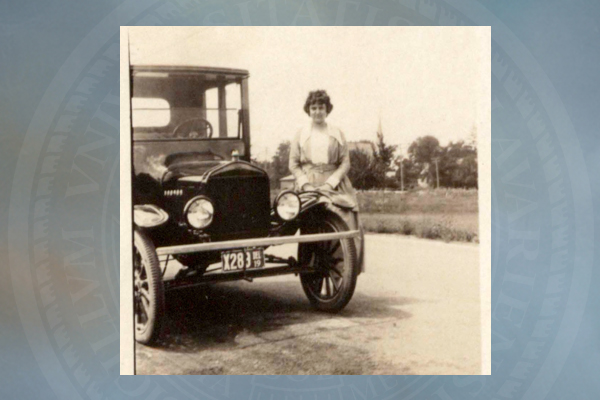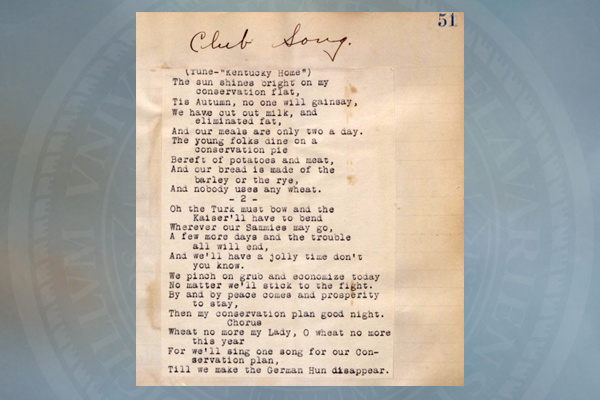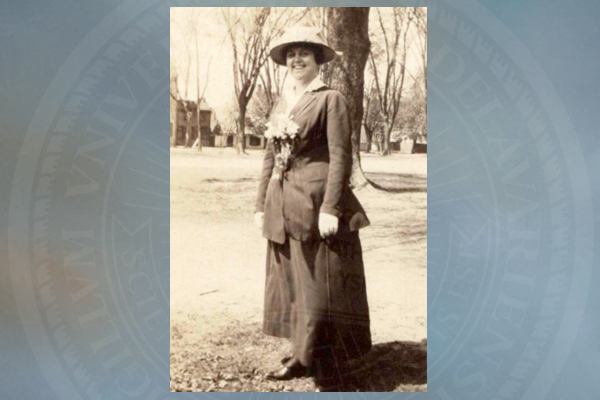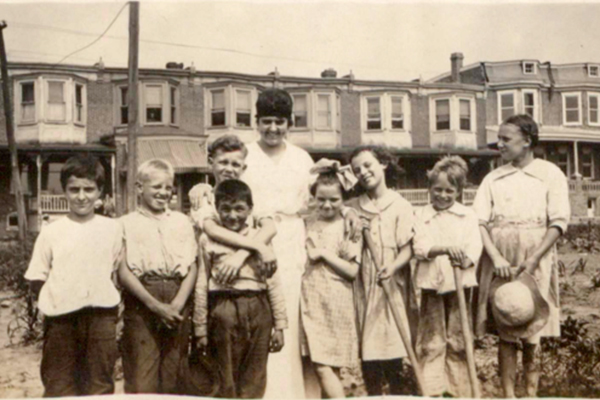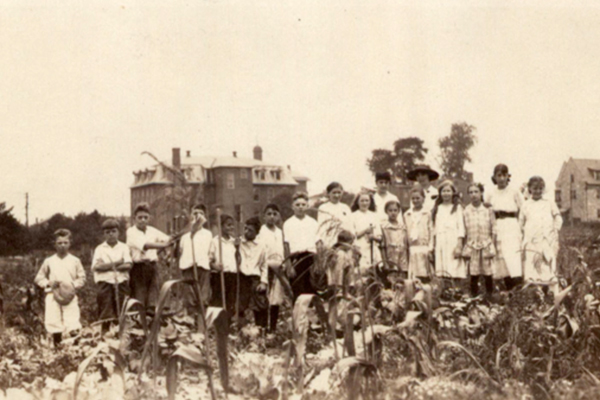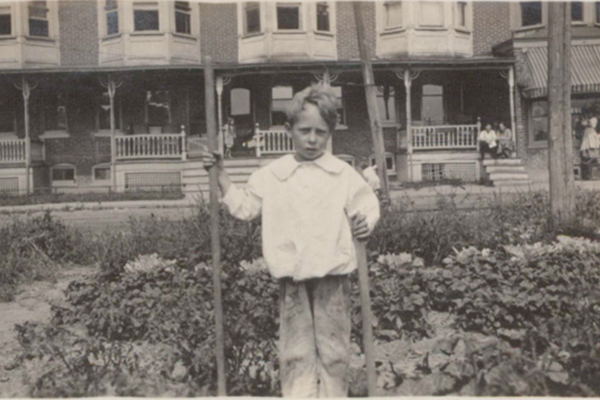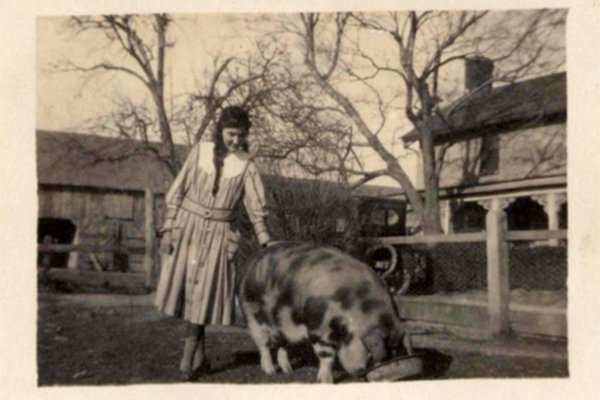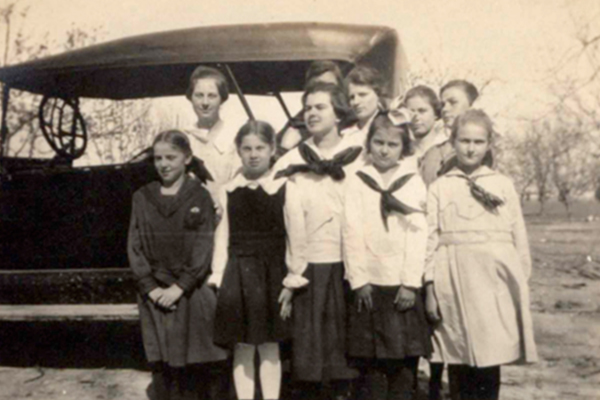

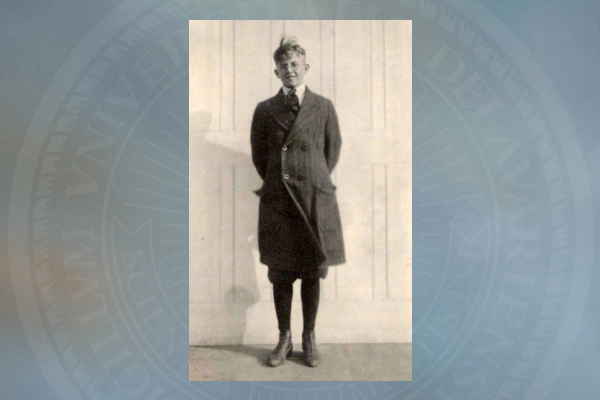
Liberty Clubs
Library announces digital access to Agnes P. Medill Liberty Clubs scrapbook
9:32 a.m., Aug. 5, 2014--The University of Delaware Library has announced the opening of a new digital collection, the Agnes P. Medill Boys' and Girls' Liberty Clubs of Delaware scrapbook.
The scrapbook, created in 1918, illustrates American homefront patriotism during World War I and also reflects the influence of UD’s Cooperative Extension program, which is celebrating its 100th anniversary this year.
Campus Stories
From graduates, faculty
Doctoral hooding
Native Newarker Agnes P. Medill (1887-1985) was the assistant state club leader at Delaware College, working in a program of the college’s Extension Department to organize patriotic boys’ and girls’ clubs throughout the state.
Professor Theodore F. Martin held the position of state club leader but it was Medill who traveled the state in “Lizzie,” her Model T Ford, to meet with each club.
Medill, a former teacher at Newark Elementary School, organized and regularly visited 15 clubs with 315 members throughout the state and as many as 400 school children in Wilmington schools who participated in the clubs.
During the 1918 school year, Medill organized clubs in Newport, Bridgeville, Stanton, Black Swamp, Redden, Georgetown, Greenwood, Townsend, Welsh Tract, Harrington, Newark and Wilmington.
Working with agents from the U.S. Department of Agriculture, Medill made presentations in schools to explain the importance of food conservation and preservation for the war effort. She helped students to start local canning, baking, sewing, millinery, corn, calf, gardening, pig and poultry clubs. She directed students in creating garden plots in schoolyards. Many children pursued home gardens and projects with the cooperation and encouragement of Delaware public schools.
Medill met with the clubs over a two-week cycle, directing gardening work, teaching domestic science activities and helping Delaware College Extension to run contests for prizewinning club work.
Liberty Clubs were part of a nationwide movement that included Boys' and Girls' Clubs, Girl Scouts, Boy Scouts and Camp Fire Girls, but they had the focused dedication of bringing children to support the war effort through productivity and leadership.
Club members ranging in age from 10-18 pledged to their flag and nation, “I consecrate my head, heart, hands, and health through food production and food conservation to help win the war and the world peace.”
The tenor of patriotism is prominent through club songs featuring lyrics to popular tunes: the round of “Hoe, hoe, hoe your row” enlivened field work and clubs offered rousing performances of the Battle Cry of Feed’em to the tune of the Battle Cry of Freedom.
We’ve an army now in camp of a million boys or more
Shouting the battle cry of feed’em
And we’ll furnish them with guns and with food a mighty store
Shouting the battle cry of feed’em
(Chorus)
We have bought a bond for freedom and boosted Uncle Sam
Shouting the battle cry of feed’em
We have cut our daily ration to Johnny cake and jam
Shouting the battle cry of feed’em …
Chorus
Our Allies forever, hurrah boys, hurrah!
Down with the Kaiser, up with our law
For we’ll rally round the flag, boys,
We’ll rally once again,
Shouting the battle call of feed’em!
News clippings throughout the scrapbook reveal interest in reform, domestic science, efficiency and modernization. The Delaware Women's College trained home economists who taught in high schools and worked as agricultural extension agents.
The scrapbook includes numerous photographs of the clubs and members who received accomplishment citations, several of whom traveled with Medill to attend the National Conference of Boys' and Girls' Clubs in 1918 and 1919. Another group of school children traveled with her to Camp Vail in Springfield, Massachusetts, for a national or regional gathering in 1919.
Agnes Philena Medill, daughter of George David Medill and Philena Pennock Medill, was born in Newark, Delaware, on Sept. 8, 1887, and died on Aug. 8, 1985, at the Episcopal Home in Hockessin, Delaware.
Sometime after 1922, she married Joseph M. McVey. They lived on South College Avenue and raised three children. Medill belonged to the First Presbyterian Church, the Newark New Century Club and the Newark Senior Citizens Center. McVey Elementary School is named after her husband, a former president of the board of education of the Christina School District.
The original scrapbook is available for research in Special Collections at the University of Delaware Library. The online finding aid to the scrapbooks links directly to the digitized volume, which is hosted in UDSpace, the digital institutional repository of the University of Delaware.
Digitization of the Agnes P. Medill Boys’ and Girls’ Liberty Clubs of Delaware scrapbook was a collaboration between library staff in the Manuscripts and Archives Department, the Center for Digital Collections and the Library Server and Data Management Department.
About Special Collections
Holdings of Special Collections of the University of Delaware Library include books, manuscripts, maps, prints, photographs, broadsides, periodicals, pamphlets, ephemera and realia from the 15th to the 21st century. The collections complement the library's general collections with particular strengths in the subject areas of the arts; English, Irish and American literature; history and Delawareana; horticulture; and history of science and technology. The University of Delaware Archives is separately administered and comprises university records and history of the institution. Special Collections is located on the second floor of the Morris Library.




